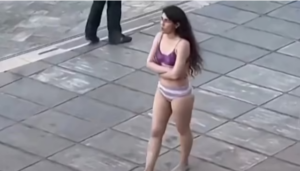Concerns have been raised about the fate of an Iranian student who was arrested for walking publicly in her underwear as a form of protest against the regime. According to the government’s narrative, the young woman is “disturbed” and is receiving treatment. However, it appears that transferring dissenters to psychiatric hospitals is a common practice aimed at “silencing” them.
The student stripped down on Saturday (November 2) and walked around the Azad University campus in Tehran. Her act was seen as a protest against the strict Islamic dress code, and a video of her walking publicly in her underwear went viral worldwide.
“Instead of viewing this issue from a security perspective, it would be better to look at it from a social perspective and to seek to resolve the problems of this student as a disturbed individual,” said government spokesperson Fatemeh Mohajeran, in the first official response to the incident.
She stated that the young woman, referred to on social media as Ahu Dariayi, was transferred from the police station to a treatment center, but the type of treatment she would undergo was not disclosed.
Imprisonment of dissenters in psychiatric hospitals
The Center for Human Rights in Iran issued a statement expressing fears for the student and condemning the “forced transfer of protesters, dissenters, and political prisoners to psychiatric hospitals as a tool of repression aimed at delegitimizing acts of protest and silencing different voices,” noting that this has become increasingly common since the outbreak of protests in 2022 following the death of Mahsa Amini.
“Iranian authorities systematically use involuntary psychiatric hospitalization as a tool of repression, labeling protesters as mentally unstable to undermine their credibility,” said Hadi Ghaemi, director of the Center.
“The authorities isolate the individual, intensify pressures, and block journalists and civil society members from investigating or reporting on the case,” Ghaemi added.
The Center for Human Rights in Iran calls on the United Nations, governments, and medical and psychiatric associations worldwide to demand that Iranian authorities:
- Release the student and protect her human rights.
- Stop the confinement of protesters and political prisoners in psychiatric hospitals.
- Respect the people’s right to protest peacefully.
“The transfer of individuals participating in peaceful protests to psychiatric hospitals is not only an act of arbitrary detention but also a form of kidnapping. This practice is blatantly illegal and devalues activists by labeling them as mentally unstable,” Ghaemi emphasized.
Iranian Nobel Peace Prize laureate Narges Mohammadi, who is imprisoned and “punished” by being denied medical care, commented on the student’s arrest: “The regime cannot force protesting women, who have made their bodies symbols of dissent and resistance against misogyny and tyranny, to retreat by labeling them as ‘mentally unstable,’ ‘sexually deviant,’ or ‘misled.'”
According to the Center for Human Rights in Iran, international law strictly prohibits coercive psychiatric treatment without confirmation from a “qualified mental health professional” that such treatment is “urgently necessary to prevent immediate or imminent harm to the patient or others.”
Students Transferred to Psychiatric Hospitals
A similar incident involving a student occurred on October 2, 2022. Then, a fellow student at Allameh Tabataba’i University, Melika Gharegozlou, was arrested and sentenced to four years in prison for not wearing a hijab in a video.
On November 16, 2022, she was forcibly transferred to Aminabad Psychiatric Hospital in Tehran without her consent and without informing her family or lawyer. There, she reported being tortured and went on a hunger strike to protest her treatment.
A year later, in November 2023, a video surfaced showing a young woman, Roya Zakeri, in Tabriz shouting “Death to the dictator” after being harassed by morality police for her hijab. Shortly thereafter, reports emerged claiming she had been transferred to a psychiatric hospital in Tabriz.
“The Islamic Republic tried to portray me as mentally ill. I am absolutely healthy physically and mentally!” Zakeri stated in a video after her release on bail.
“Psychological Centers” for Students
According to the Center for Human Rights in Iran, during the protests over Amini’s murder, students accused of participating in the demonstrations were taken to “psychological centers” under the pretext of rehabilitation. Authorities used this practice as an excuse to abduct and illegally detain children who dared to participate in the protests, the Center reports.
Judicial Decisions Labeling Protesters as “Mentally Unstable”
Additionally, in July 2023, three prominent Iranian actresses, Azadeh Samadi, Leila Bolukat, and Afsaneh Bayegan, were deemed by judicial authorities to be mentally ill and suffering from antisocial personality disorder for defying mandatory hijab laws.
Bayegan was sentenced to mandatory therapy sessions every two weeks for her refusal to wear the hijab in public, along with a two-year suspended prison sentence and a two-year ban on using social media and traveling.
This prompted four leading psychiatric councils in Iran to issue a joint letter to the head of the judiciary, Mohseni Ejei, emphasizing that “the diagnosis of mental disorders falls under the jurisdiction of a psychiatrist, not a judge. Just as the diagnosis of other illnesses belongs to doctors, not judges.”
Furthermore, Saman Yasin, a Kurdish rapper and outspoken critic of the regime who was arrested during the protests for Amini, was hospitalized in a psychiatric ward on July 23, 2023, just two days after he released an audio message from prison discussing the injustices he faced during his trial and the torture he endured while in custody.
Yasin was transferred to Razi Psychiatric Hospital in southern Tehran, the same hospital where political prisoner Behnam Mahjoubi was tortured before he died.
The Center for Human Rights in Iran has published the names of prisoners who have been forcibly transferred to psychiatric hospitals:
- Political prisoner Javad Mohammadi-Fard
- Political prisoner Shahram Kazemian
- Political prisoner Saber Balandeh
- Human rights activist Majid Rezaei
- Student Armita Pavir
- Human rights lawyer Payam Derafshan
- Teachers’ rights activist Hashem Khastar
- Political activist Leila Mirghafari
- Journalist Kianoush Sanjari
- Political activist Sakineh Parvaneh
- Political activist Farzin Rezaie-Roshan
- Political activist Ali Nouri
- Political activist Meysam Bahramabadi
- Political activist Amir Mehdi Tabasi
- Journalist and activist Hengameh Shahidi
- Political activist Zahra Jabari
- Journalist Kianoosh Sanjari
- Political prisoner Babak Dadbakhsh
Ask me anything
Explore related questions





